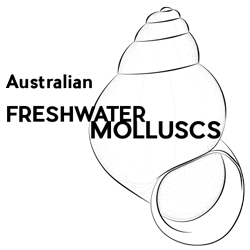
This is one of several species of Austropyrgus found in the southern half of New South Wales. They are all very similar, being separated on small differences in size and shape of the shells and in anatomical details. They have elongate-conic shells with adults having a slightly thickened aperture and the operculum bears several pegs. Most species of Austropyrgus are geographically isolated and have restricted ranges. This species is found in the high country behind Eden.
Austropyrgus synoria can be distinguished from the other New South Wales species the subpupiform shell which usually has a weakly-convex to convex spire outline and the outer lip is heavily thickened.
Austropyrgus synoria Clark, Miller & Ponder, 2003
Class Gastropoda
Infraclass Caenogastropoda
Order Littorinida
Suborder Rissoidina
Superfamily Truncatelloidea
Family Tateidae
Genus Austropyrgus Cotton, 1942
Original name: Austropyrgus synoria Clark, Miller & Ponder, 2003. In Clark, S. A., Miller, A. C. & Ponder, W. F. (2003). Revision of the snail genus Austropyrgus (Gastropoda: Hydrobiidae): A morphostatic radiation of freshwater gastropods in southeastern Australia. Records of the Australian Museum Supplement 28: 1–109.
Type locality: Tributary of Myrtle Creek on road to Candelo, Eden district, New South Wales.
In streams on water weeds, hard substrata (rocks etc.) and crawling on litter and sediment. Can be locally abundant. Assumed to feed by scraping bacteria and microalgae. Presumed solitary capsules with single egg. Direct development.
Known from southern New South Wales in high country behind Eden.
Most species of Austropyrgus are geographically isolated and have restricted ranges, and this one is no exception.
Clark, S. A., Miller, A. C. & Ponder, W. F. (2003). Revision of the snail genus Austropyrgus (Gastropoda: Hydrobiidae): a morphostatic radiation of freshwater gastropods in southeastern Australia. Records of the Australian Museum 28: 1–109.